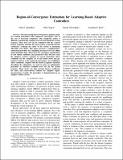Region-of-convergence estimation for learning-based adaptive controllers
Author(s)
Topcu, Ufuk; Chowdhary, Girish; Quindlen, John Francis; How, Jonathan P
Download24303ac4ee8551761559011f117ffaf27801.pdf (1.889Mb)
OPEN_ACCESS_POLICY
Open Access Policy
Creative Commons Attribution-Noncommercial-Share Alike
Terms of use
Metadata
Show full item recordAbstract
Recent learning-based extensions to popular adaptive control procedures offer improved convergence, but at the cost of increased complexity. This complexity makes it difficult to analytically compute level sets that bound the system response. These level sets can be combined with the a priori known Lyapunov function for such systems to provide barrier certificates, verifying the safety of the system to maximum allowable error limits. This paper presents a complementary automated procedure for computing invariant level sets offline using simulation data. These level sets encompass combinations of safe initial conditions and parameters that will not cause the adaptive system's response to exceed constraints. First, conditions for the complete set of safe initial states and parameters, known as the region-of-convergence, are established. These conditions, coupled with the known Lyapunov functions describing the adaptation, are used to form an optimization procedure to construct verifiable level sets for the system response. These levels sets thus provide barrier certificates for safety and conservatively estimate the complete regionof-convergence. Lastly, the procedure is demonstrated on an adaptive control system.
Date issued
2016-07Department
Massachusetts Institute of Technology. Aerospace Controls Laboratory; Massachusetts Institute of Technology. Department of Aeronautics and AstronauticsJournal
2016 American Control Conference (ACC)
Publisher
Institute of Electrical and Electronics Engineers (IEEE)
Citation
Quindlen, John F., et al. "Region-of-Convergence Estimation for Learning-Based Adaptive Controllers." 2016 American Control Conference (ACC), 6-8 July, 2016, Boston, Massachusetts, IEEE, 2016, pp. 2500–05.
Version: Author's final manuscript
ISBN
978-1-4673-8682-1